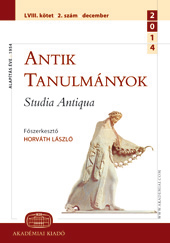Palmyra közvetítő szerepe a keleti kereskedelemben
Palmyra's intermediary role in eastern commerce
Author(s): Tibor GrüllSubject(s): Historical Geography, Economic history, Ancient World
Published by: Akadémiai Kiadó
Keywords: Palmyra; Eastern trade; Egypt; India; South Arabia; connections between East and West;
Summary/Abstract: One of the obvious example of the often mentioned “Levantine spirit of profiteering” is Palmyra. Th e city-state which gradually went under Roman influence from the 1st century B.C. onwards, became one of the richest metropolis of the ancient Near East during the following two centuries. This is clearly witnessed by the magnificent ruins of Palmyra in the Syrian desert. The town is often coined – after the influential work of Michael Rostovtzeff – as a “caravan city”. Although this debated term is essentially relevant in our opinion, we have to stress that Palmyra was the main organizer and defender of the caravans, not the main target of them. The secret of Palmyra’s arising was the Eastern trade in which she bear the brunt from the Seleucid era onwards. The commerce with the silk of China, spices, gems and pearls of India, incense of Arabia provided a fabulous profit for the Palmyrean entrepreneurs who were present in the small kingdoms of Mesopotamia, the principalities of Arabia, the Roman ports along the Red Sea and the commercial centers of West India (Scythia) as well. Palmyreans played the middlemen’s role in the arborescent Eastern trade, and not only between the East and the Mediterranean – in which we are obviously more interested –, but also among the Eastern kingdoms themselves. A considerable part of the enormous profit of this transmitting commerce flew into Palmyra, which in the third century AD – taking the advantage of the political, social, and economic crisis of the Roman Empire – not surprisingly gained political power over a considerable part of the Eastern Roman Empire including Egypt. The military and economic power of Palmyra, however, was not enough against the indisposed Imperium Romanum. After the defeat in 272 AD Palmyra never get on her feet and in consequence of the fall of the metropolis her traders got lost their influence as well.
Journal: Antik Tanulmányok
- Issue Year: 58/2014
- Issue No: 2
- Page Range: 247-259
- Page Count: 13
- Language: Hungarian
- Content File-PDF

